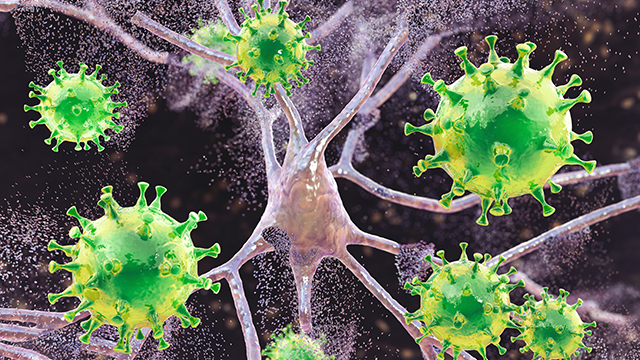Study: COVID-19 Can Accelerate Brain Aging, Lead to Irreversible Neurological Conditions
Oct. 5, 2022By Ella Hohmann
Tiny leakages of blood in crucial brain regions of patients infected with Covid-19 can accelerate brain aging and lead to irreversible neurodegenerative conditions, according to a Houston Methodist review study.
The review of existing COVID-19 literature noted that brain imaging studies have confirmed the prevalence of microstructural vascular changes and microbleed lesion formation in deeper regions related to cognitive and memory functions, both a result of the virus. Aging is a critical determinant in the onset, progression and outcome of coronavirus disease in the elderly.
"COVID-19-induced microhemorrhagic lesions may exacerbate DNA damage in affected brain cells, resulting in neuronal senescence and activation of cell death mechanisms, which ultimately impact brain microstructure-vasculature," says Dr. Muralidhar L. Hegde, Ph.D., a professor of neurosurgery at Houston Methodist and a corresponding author of the review. "These pathological phenomena resemble hallmarks of neurodegenerative conditions like Alzheimer's and Parkinson's diseases and are likely to aggravate advanced-stage dementia, as well as cognitive and motor deficits."
The review, which also noted COVID-19 in the brain may increase the risk of stroke, concluded that the loss of neuronal cells in affected brain areas may be attributed to a combination of senescence and ferroptosis, along with acute inflammation-induced oxidative stress-mediated cell death. It added that "the crosstalk between these phenomena needs further exploration."
The review, "SARS-CoV-2 and the Central Nervous System: Emerging Insights into Hemorrhage-Associated Neurological Consequences and Therapeutic Considerations," was published online in July in Ageing Research Reviews.
Worldwide, there now have been more than 6.5 million deaths and 615 million reported cases of COVID-19. The U.S. has accounted for more than 1 million of the deaths and almost 90 million of those cases.
Evidence suggests coronaviruses are neuro-invasive in nature
Although most of the attention has focused on SARS-CoV-2 as a respiratory virus, it also can infect the brain in multi-modal pathways. Researchers are studying the effects of COVID-19 on various aspects of the central nervous system.
The review notes that studies have demonstrated the disease's impact goes well beyond the time of infection. For instance, 20% to 30% of patients report "brain fog," including memory loss, concentration difficulties, forgetfulness, verbal struggles, disoriented thought processes, emotional numbness and taking longer than the usual time to complete a regular task.
In the review, the research team critically evaluated the possible chronic neuropathological outcomes in aging and comorbid populations if timely therapeutic intervention is not implemented.
The researchers note there is significant evidence suggesting coronavirus strains are neuro-invasive in nature and can stimulate the activation of multiple pathogenic mechanisms, leading to complex forms of neurocognitive and neurodegenerative conditions.
For example, acute anosmia is common in COVID-induced neuro-pathogenesis because the coronavirus causes damage in to the olfactory bulb and forebrain areas. Moreover, neurocognitive decline occurs as a result of hemorrhagic microbleeds, neuroimmune activation and cytokine storms, which can then lead to dysregulated signaling of vital cascades, such as the ones controlling amyloidogenesis and necroptotic pathways.
Dysregulated amyloidogenesis leads to a build-up of toxic amyloid plaques that prevents affected cells and tissues from functioning properly and may be associated with increased pathophysiology and cognitive decline in Alzheimer's patients.
Strategies to improve neurodegenerative outcomes
The researchers also noted that a multitude of cellular stresses inhibit virus-infected cells from undergoing their normal biological functions, causing them to enter "hibernation mode" or even die completely.
The paper calls for more mechanistic studies to determine the implications of microhemorrhages in the brains of COVID-19 survivors to better strategize therapeutic options. Nevertheless, it suggests various strategies to improve some of these long-term neuropsychiatric and neurodegenerative outcomes.
"A potential therapeutic option may include the implementation of the therapeutic regimen of the "nanozyme" in combination with various FDA-approved drugs that may prove successful to fight against this catastrophic disease," says Joy Mitra, Ph.D., a Houston Methodist instructor and a corresponding author.
The paper also calls for careful medical and clinical follow-ups to be performed to diagnose early symptoms of neuropathological, neuropsychiatric and/or cardiovascular dysfunctions to prevent patients from developing irreversible motor or cognitive impairments and cardiovascular disorders.
Research in the authors' laboratories is supported by grants from the NIH's National Institute of Neurological Disorders and Stroke and National Institute of Aging; The Welch Foundation; and the Houston Methodist Research Institute.
Other researchers collaborating with Mitra and Hegde on the paper were Houston Methodist investigators Manohar Kodavati, Vincent E. Provasek, K.S. Rao, Sankar Mitra, Dale J. Hamilton, Philip J. Horner, Farhaan S. Vahidy, Gavin W. Britz and Texas A& M professor Thomas A. Kent.


